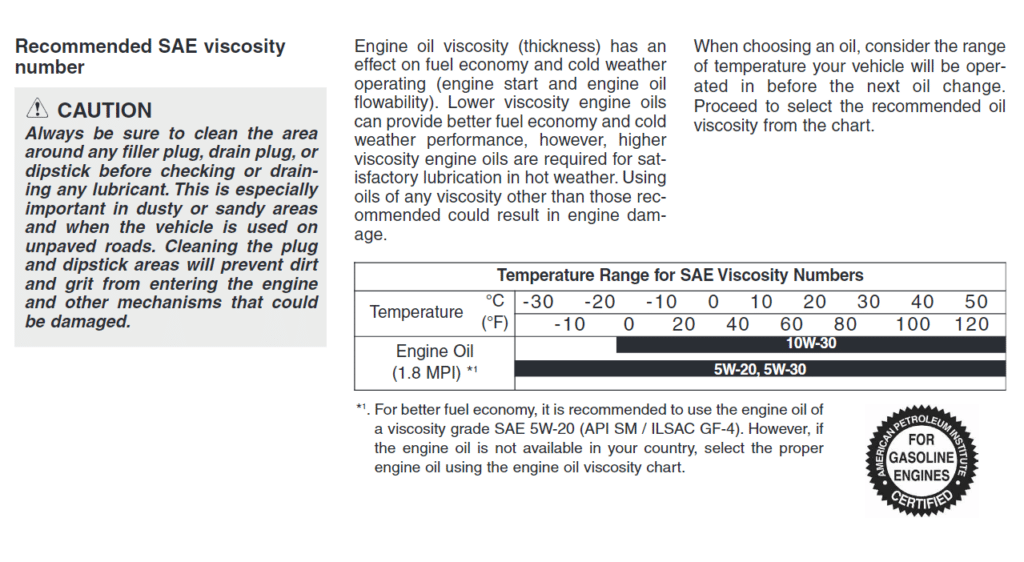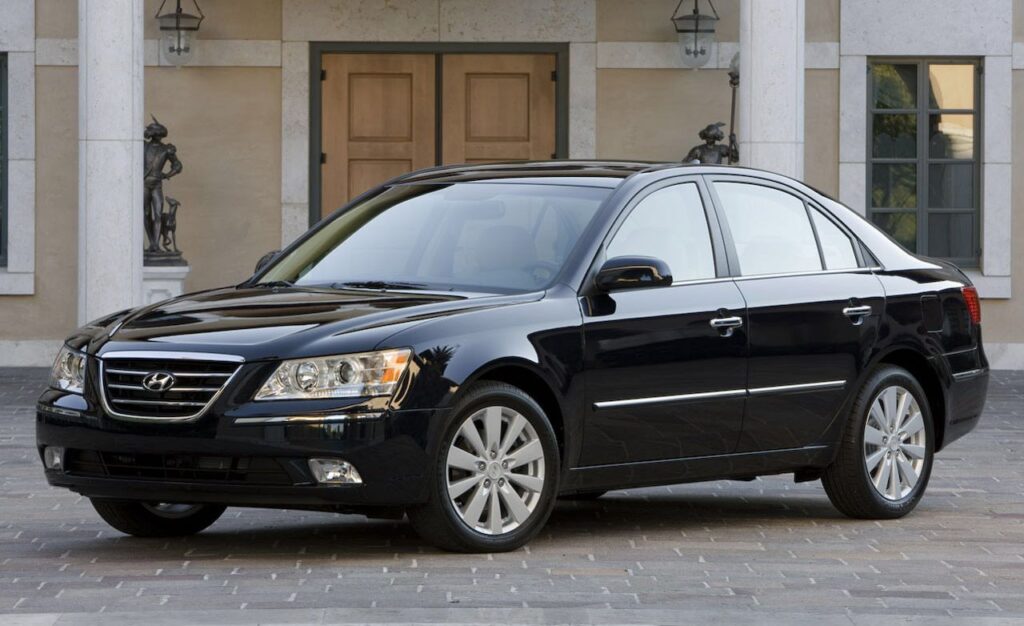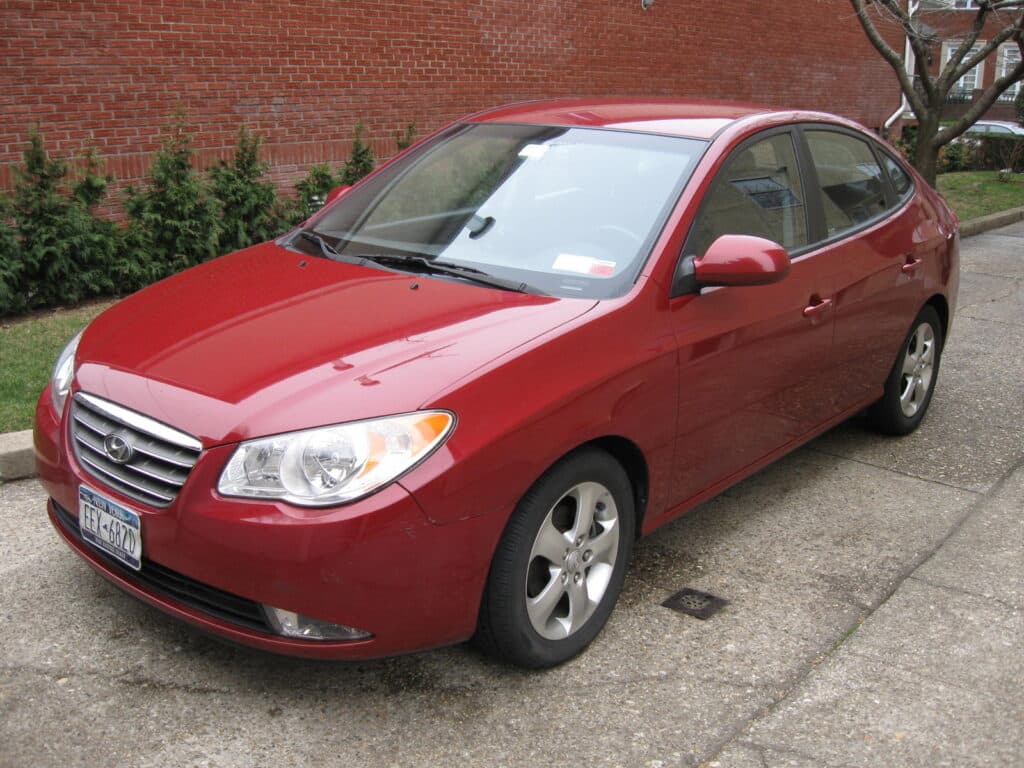As a professional mechanic, I cannot stress enough the importance of choosing the right engine oil for your 2013 Hyundai Elantra. The engine oil you use plays a crucial role in protecting your engine’s components, ensuring smooth performance, and maximizing fuel efficiency. Using the wrong type of oil can lead to premature wear, engine damage, and reduced fuel economy.
There are several factors that can affect your engine oil choice, including the specific engine in your vehicle, the climate you live in, and the type of driving you do. In this guide, I’ll help you understand the importance of selecting the appropriate oil for your 2013 Hyundai Elantra and provide tips for maintaining your engine in top condition.
What Type of Oil Does a 2013 Hyundai Elantra Take?
Hyundai recommends using SAE 5W-20 (API SM / ILSAC GF-4) engine oil for your 2013 Hyundai Elantra 1.8 MPI engine. This specific oil type offers optimal fuel economy, as it has a lower viscosity that improves cold weather performance and engine start capabilities. Keep in mind that while lower-viscosity oils provide better fuel economy, higher-viscosity oils are necessary for adequate lubrication in hotter climates.

When changing the engine oil in your 2013 Hyundai Elantra, be sure to use the correct amount. The oil capacity for your vehicle, including the filter, is 4.23 US qt. (4.0 l). Using the proper amount of oil will ensure your engine is well-lubricated, which helps prevent excessive wear and potential damage to its components.
Viscosity is a measure of an oil’s resistance to flow, and it plays a significant role in your engine’s performance, fuel economy, and cold-weather operation. Lower viscosity oils, such as 5W-20, flow more easily at lower temperatures, improving engine start capabilities and reducing friction between engine components. This results in better fuel economy and overall performance, especially in colder climates.
While lower-viscosity oils offer benefits in cold weather and fuel economy, it’s essential to strike a balance with higher-viscosity oils for optimal engine protection. Higher viscosity oils, like 10W-30 or 10W-40, provide a thicker film of lubrication that is necessary for proper engine function in hotter weather or during high-load driving conditions.
The right oil viscosity for your 2013 Hyundai Elantra depends on various factors, such as your climate and driving habits. Always consult your owner’s manual and follow the recommended oil viscosity to ensure your vehicle’s engine receives the appropriate level of protection and performs efficiently.
Maintenance Schedule And Oil Changes
Following a regular maintenance schedule for oil and filter changes is essential to keep your 2013 Hyundai Elantra running smoothly and efficiently. Consult your owner’s manual for the recommended intervals, as these may vary depending on factors such as the specific engine in your vehicle and the type of oil used. Generally, most vehicles require oil and filter changes every 5,000 to 7,500 miles. Regular oil changes ensure that your engine remains well-lubricated and prevents the buildup of sludge and other harmful deposits.
Suppose you often drive your 2013 Hyundai Elantra under severe conditions, such as heavy traffic, frequent short trips, dusty or sandy environments, or on unpaved roads. In that case, you may need to change the engine oil and filter more frequently. Severe driving conditions can cause the oil to break down faster, reducing its ability to effectively lubricate and protect your engine. In such cases, consider reducing the oil change interval to ensure your vehicle’s engine remains in optimal condition. Refer to your owner’s manual for guidance on adjusting the maintenance schedule based on your driving conditions.
Cleaning And Checking The Engine Oil
As a professional mechanic, I cannot emphasize enough the importance of cleaning the filler plug, drain plug, and dipstick areas before checking or draining any lubricant from your 2013 Hyundai Elantra.
Ensuring these areas are clean is especially crucial in dusty or sandy environments and when driving on unpaved roads. Proper cleaning minimizes the risk of contaminants entering the engine, which can cause damage to internal components and reduce the engine’s overall performance.
To prevent dirt and grit from entering your engine, follow these steps when checking or changing your engine oil:
- Use a clean cloth or rag to wipe the area around the filler plug, drain plug, and dipstick. This will remove any dirt, dust, or debris that could enter the engine during the oil change process.
- Remove the filler plug or dipstick and inspect the oil level. If necessary, add the recommended oil to reach the appropriate level.
- If you’re draining the oil, make sure to place a clean drain pan beneath the drain plug to catch the used oil.
- After draining the oil, replace the drain plug and tighten it securely. Be cautious not to overtighten the plug, as this may cause damage.
- Fill the engine with the recommended oil type and quantity, then replace the filler plug or dipstick.
- Start the engine and let it run for a few minutes to circulate the fresh oil. Finally, check the oil level again and add more if needed.
Following these steps and keeping the engine oil areas clean will help protect your 2013 Hyundai Elantra’s engine and ensure its longevity and performance.
Safety Considerations When Handling Engine Oil
Used engine oil contains chemicals that can pose potential health hazards if not handled properly. These chemicals are known to the State of California to cause cancer, birth defects, and reproductive harm. Prolonged skin contact with used engine oil may cause irritation or even skin cancer. Moreover, some chemicals found in used engine oil have been shown to cause cancer in laboratory animals.
To minimize the risk of exposure to harmful chemicals found in used engine oil, follow these safety guidelines when handling it:
- Wear protective gloves: Before starting any oil change or handling used engine oil, wear nitrile or latex gloves to protect your skin from direct contact with the oil.
- Avoid prolonged contact: If you accidentally get used engine oil on your skin, promptly wipe it off using a clean cloth or rag.
- Wash hands thoroughly: After handling used engine oil, wash your hands thoroughly with soap and warm water as soon as possible. This helps remove any residual oil and reduces the risk of skin irritation or other health issues.
- Dispose of used engine oil responsibly: Collect it in a suitable container and take it to a recycling center or an authorized disposal facility. Never pour used oil down drains or into the environment.
Following these safety precautions when handling engine oil can protect yourself from potential health hazards and ensure a safe and clean working environment.
Conclusion
Selecting the appropriate oil for your 2013 Hyundai Elantra is crucial for your vehicle’s overall health and performance. Using the right oil not only ensures smooth engine operation but also helps maximize fuel efficiency and prolong the life of your engine.
Always refer to your owner’s manual and follow the recommended oil viscosity and type to provide the best protection for your engine.










